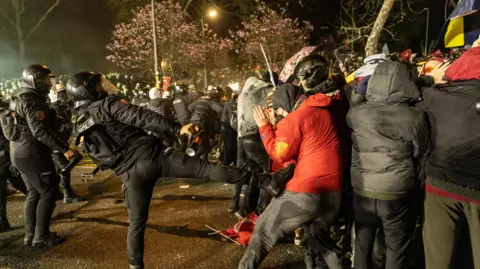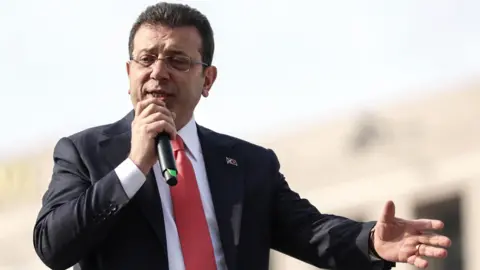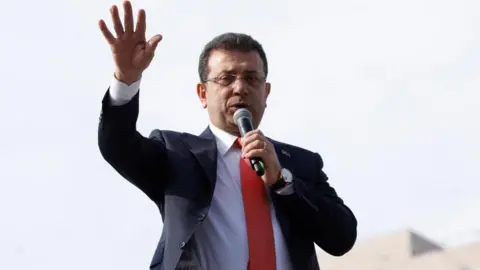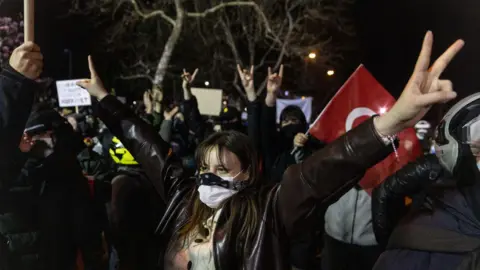What would happen if a key political figure in your country was suddenly jailed? You might feel a mix of confusion, anger, and even helplessness as you watch the unfolding events. As the case of Ekrem Imamoglu develops, these feelings might resonate with many people. Imamoglu, the mayor of Istanbul and a prominent challenger to President Recep Tayyip Erdogan, has faced serious allegations that have led to his detention and arrest. Let’s unpack this incident, exploring its implications for Turkish democracy and the broader political landscape.
Who is Ekrem Imamoglu?
Ekrem Imamoglu emerged on the political scene as a member of the Republican People’s Party (CHP) and quickly became a beacon of hope for many in Turkey. His ability to connect with ordinary citizens and address their concerns made him a popular figure, especially during the 2019 Istanbul mayoral election, which he won under controversial circumstances. Many saw his victory as a turning point for the opposition, as it signaled a growing desire for change in a country long dominated by Erdogan.
With plans to become the CHP’s presidential nominee for the upcoming 2028 elections, Imamoglu stood as a formidable opponent to Erdogan. However, his journey has taken a dramatic turn with his recent arrest.
The Arrest: What Happened?
Just as Imamoglu was preparing to solidify his candidacy for the upcoming presidential elections, he was arrested and formally charged with various offenses, including corruption and managing a criminal organization. These allegations are serious and come in the context of a broader crackdown on dissent in Turkey. Imamoglu has vehemently denied the charges, characterizing them as politically motivated, aimed at silencing opposition.
The arrest came on the heels of a significant political moment. Imamoglu was not only a mayor but a symbol of potential change against a government accused of authoritarianism. His detention sparked massive protests across Turkey, indicating that his arrest was not merely a local issue but one that resonated nationwide.
The Charges Against Imamoglu
The specific charges brought against Imamoglu include:
- Establishing and managing a criminal organization
- Taking bribes
- Extortion
- Unlawfully recording personal data
- Rigging a tender
Understanding these charges is crucial, especially since they reflect serious allegations that, if proven, could have led to severe consequences for Imamoglu and his political career. Critics of the government argue that these charges are exaggerated, concocted to eliminate a significant rival in the early stages of the election cycle.
The Political Landscape in Turkey
Turkey’s political environment has been increasingly strained in recent years. Erdogan’s rule, spanning over two decades as both Prime Minister and President, has been characterized by growing centralization of power. The political landscape is marked by restrictions on free speech, media suppression, and systematic crackdowns on opposition figures.
The arrest of Imamoglu is not an isolated event but part of a pattern where dissenting voices are silenced. With his detention, many fear it represents a significant step toward authoritarian governance, shifting the balance of power even further in favor of the ruling party.

The Reaction: Protests Erupt
Following the announcement of Imamoglu’s arrest, protests erupted across Turkey. The public display of discontent indicated that many citizens were not willing to accept what they perceived as an attack on democracy. Crowds gathered in key urban areas, particularly in Istanbul, where they raised their voices against the government, calling for justice and freedom.
Size and Scope of the Protests
The protests are notable for their scale and intensity. They have attracted thousands of participants, including both ardent political supporters of Imamoglu and everyday citizens concerned about their rights. This public outcry has been further fueled by social media, with people sharing their experiences and rallying support.
Table: Key Facts about the Protests
| Aspect | Details |
|---|---|
| Duration | Ongoing for multiple nights |
| Estimated Participants | Thousands across major cities |
| Government Response | Tactical use of police force including pepper spray and water cannons |
| Arrests | Over 700 individuals detained |
The Implications for Democracy
Imamoglu’s situation raises significant questions about the future of democracy in Turkey. The charges against him and the government’s response to protests present a troubling picture. How pressing is the decline of democratic norms in a nation historically rich in diverse opinions?
Judicial Independence at Stake
One of the fundamental tenets of democracy is an independent judiciary. However, many observers have expressed concerns regarding the impartiality of Turkey’s legal system, particularly in politically charged cases. The fact that Imamoglu’s trial is unfolding in this context raises doubts about whether justice can truly be served.
Margin of Error for Opposition
As an opposition figure, Imamoglu represented hope for those advocating for a shift in policies aimed at greater freedom and equity. However, his detention puts other potential challengers on notice. Opposition figures often have to weigh their risks against the benefits of standing up for their convictions, creating a chilling effect on political activism.

Government’s Stance and Criticism
From the government’s perspective, Erdogan’s administration has condemned the protests and the narratives suggesting that the arrests are motivated by political vendettas. Moreover, officials argue that accusations of political repression undermine the country’s judicial independence. However, these claims are met with skepticism from both domestic and international observers, who see a pattern of silencing dissent.
International Response
The international community is also watching these developments closely. Concerns have been raised by various global entities regarding human rights violations and the erosion of democratic principles in Turkey. Some organizations have issued statements urging the government to respect civil rights and curb overreach against opposition figures.
The Social Media Factor
In the context of the protests and the arrest, social media has played a crucial role. Platforms like X (formerly Twitter) have been utilized to organize protests, share news, and mobilize citizens. However, there has also been pushback from authorities, including measures that have sought to restrict access to social media accounts.
Blocking Accounts
In response to the unrest, Turkey’s communications regulator has blocked numerous accounts linked to political figures and journalists. These actions have prompted backlash from social media companies, who argue that free discourse is being impeded. The situation underscores the ongoing complexities around communication in a politically charged environment.

Community Sentiment
The atmosphere in Turkey is charged with uncertainty regarding the future. Citizens are grappling with feelings of helplessness mixed with resilience. The protests have united people from different backgrounds, showcasing a collective yearning for justice and the preservation of democratic values.
Voices from the Streets
Many protesters have voiced their desire for a future rooted in fairness and democratic governance. One young mother expressed her concerns about her son’s future in Turkey, emphasizing the importance of justice and liberty. These individual sentiments reflect a broader dissatisfaction with the current political climate, echoing the calls for change.
Looking Ahead: What’s Next for Imamoglu?
As the situation develops, many wonder what lies ahead for Imamoglu and Turkish politics. Will he be able to mount a successful legal defense? Can he continue to inspire a movement for change in the face of governmental repression?
Legal Appeals and Political Future
Imamoglu’s lawyers are already preparing to challenge the legal decisions against him. Their strategy will involve pursuing appeals at various levels, including at the Constitutional Court and potentially the European Court of Human Rights. His ability to navigate these legal battles could play a critical role in determining the future trajectory of his political career.

Conclusion: The Significance of Imamoglu’s Case
The detention of Ekrem Imamoglu serves as a crucial touchpoint in the narrative of Turkish democracy. As protests continue and tensions escalate, the case raises significant concerns about governance, individual rights, and the resilience of democratic institutions in Turkey. The world is watching, waiting to see whether the nation will uphold the principles of freedom and justice in the face of adversity.
In your corner of the world, think about how freedom and democracy shape your life. Reflecting on the struggles of others can instill a sense of solidarity and inspire action. The journey toward preserving democratic ideals is ongoing, and stories like that of Ekrem Imamoglu remind us that every voice matters.
Call to Action
If you feel drawn to the issues of democracy and human rights, consider becoming more involved in advocacy or supporting organizations that work in these areas. It can be as simple as sharing knowledge or as impactful as standing with those in need of support. You can help nurture the spirit of democracy, wherever you are.
Let’s continue to raise our voices and cherish the rights we hold dear, always striving for fairness, justice, and liberty—values that should never be taken for granted.
